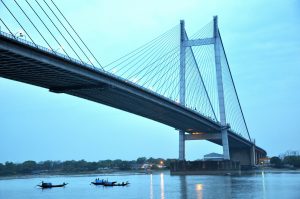This is an abbreviated version of an article by OICSD Scholar Safa Fanian. For the original, see “Risking Cities and Rivers: What are the Pathways Towards Resilience?” in the recent issue (No.181) of southasiadisasters.net, facilitated by All India Disaster Mitigation Institute under the theme “Making Humanitarian Response more Flexible: Exploring New Models and Approaches.”
Many cities have grown on riverbanks due to the strategic importance of transportation and trade in addition to social and physical resources that rivers provide. However, this comes at a cost to both the river and the city. Cities in India are laden with visions of future growth while grappling with their past of inadequate infrastructure, multiple layers of overlapping policy, and local politics. Out of the 497 census cities in India in 2011, more than 100 are situated on rivers, including Bangalore, Chennai, Delhi, Hyderabad, Kolkata, and Mumbai. Urban planning within India often overlooks the connection of risks that cities pose to and face from rivers – urban floods, water supply issues, erosion, increasing river pollution due to sewage and waste release from cities and more. Little attention is paid to the management of risks at the nexus of cities and rivers.
The 2015 Chennai floods were linked to high rainfall and backwash from the Cooum and Adyar rivers that run through the city . Mumbai’s continuing battle with urban floods is strongly also linked to blocked river channels and development on the floodplains of the Mithi, Poisar, and Oshiwara rivers. The growth of built areas in cities, decrease in open spaces (e.g. lakes and wetlands) to absorb rainfall, weak drainage, changing climate patterns and mismanagement of rivers together create a perfect recipe for the disaster of urban floods.
Most Indian cities also directly release wastewater into adjoining rivers or water bodies. The 2015 report by the Central Pollution Control Board of India noted that 37,000 million liters per day of untreated sewage water flows into rivers across the country.Rivers, into which wastewater are released, are also a source of drinking water for cities. Urban water utilities spend crores on water treatment plants on construction and maintenance to treat this water to make it safe for domestic use.
The water governance system in India has evolved since its independence. However, the legacy of colonial preference towards infrastructural solutions remain. Urban floods are sought to be controlled by improving stormwater drains within cities, increasing embankments or flood walls on the sides of rivers. The number of pumps to pump out water steadily increasing in effort to decrease inundated areas. More drains and passages constructed to quickly drain out water from the cities. But the flood damages continue to rise with each flood event. More and more Sewage treatment plants (STPs) and Water treatment Plants (WTP) are being constructed as the solution for the water problems of cities. The domestic water shortage and river pollution is still steadily increasing
This article does not try to say that infrastructure solutions are bad or that we have to leave cities or give into the romantic notions of simpler past days. What the article seeks to do is open the conversation on risks faced by cities and rivers. The governance of these risks requires a systemic perspective, one that is context specific and includes other options beyond technology and infrastructure. The rise of the Smart Cities program in India along with a drive towards rejuvenation of rivers provides an opportunity to improve management. It can allow us to go beyond technology and infrastructure solutions for improved resilience of cities and rivers. Sustaining technology and infrastructure in future Smart cities requires inclusion of Smart modes of governance as well.
